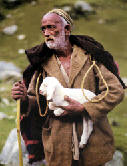|
Psalm 66
{1}Make a joyful noise unto God, all ye lands:
{2} Sing forth the honour of his name:
make his praise glorious.
{3} Say unto God, How terrible art thou in thy works!
through the greatness of thy power
shall thine enemies submit themselves unto thee.
Celebrate! The noise is not to be a mere cacophony of sound. Singing is
what brings shouting together and gives it meaning. It is a joyful noise.
And the psalmist urges us to do our best, to make his praise glorious. I
think that is what the great European organ makers were trying to do when
they created these huge instruments of such great power. So much power
that placing one finger on a key and then feeling the earth move under
your feet would indeed strike awe into a person. Reach up to your highest
talent, ability, preparation, performance. Make his praise glorious.
The NIV switches to “Awesome” for “Terrible,” but I don’t think the word
quite reaches the lever the psalmist is aiming at. The relationship
between fear and awe is familiar to anyone who has been outdoors in a
severe thunderstorm. To experience the presence of God is to have the
knees tremble. It is such great power that God’s enemies cringe before
him, while the saints tremble in Awe.
{4} All the earth shall worship thee,
and shall sing unto thee; they shall sing to thy name.
{5} Come and see the works of God:
he is terrible in his doing toward the children of men.
{6} He turned the sea into dry land:
they went through the flood on foot:
there did we rejoice in him.
{7} He ruleth by his power for ever;
his eyes behold the nations:
let not the rebellious exalt themselves.
{8} O bless our God, ye people,
and make the voice of his praise to be heard:
{9} Which holdeth our soul in life,
and suffereth not our feet to be moved.
{10} For thou, O God, hast proved us:
thou hast tried us, as silver is tried.
{11} Thou broughtest us into the net;
thou laidst affliction upon our loins.
{12} Thou hast caused men to ride over our heads;
we went through fire and through water:
but thou broughtest us out into a wealthy place.
{13} I will go into thy house with burnt offerings:
I will pay thee my vows,
{14} Which my lips have uttered,
and my mouth hath spoken,
when I was in trouble.
Not a few soldiers have made promises to God in battle, so many that it
was given a name, “foxhole conversion.” Oh Lord,” a soldier might pray.
“Just get me out of this alive and I’ll go to church every week for the
rest of my life.” The psalmist sings, “I will worship. I will keep my
promises made in extreme times.”
{15} I will offer unto thee burnt sacrifices of fatlings,
with the incense of rams;
I will offer bullocks with goats.
{16} Come and hear, all ye that fear God,
and I will declare what he hath done for my soul.
{17} I cried unto him with my mouth,
and he was extolled with my tongue.
{18} If I regard iniquity in my heart,
the Lord will not hear me:
{19} But verily God hath heard me;
he hath attended to the voice of my prayer.
There are barriers to prayer. This does not even seem to be an overt act
of sin. It is merely a sin of the heart. Perhaps it is in the same vein as
Jesus’ admonition: “But I tell you that anyone who looks at a woman
lustfully has already committed adultery with her in his heart” (Matthew
5:28 NIV). The fantasy of sin is sin, and a barrier to being heard by God.
{20} Blessed be God,
which hath not turned away my prayer,
nor his mercy from me."
Like so many psalms, this one underlines the importance of singing.
Make a joyful noise unto God, all ye lands:
Sing forth the honour of his name:
make his praise glorious.
I think some may feel a little awkward salting their speech with praise,
but there is nothing awkward about praising God in song. It is the natural
way to praise. And praise does not always have to be accompanied with
organ, piano, guitar or drums. It is the human voice raised in song that
pleases God. It is wonderful that so many of the psalms have been set to
music so that we can sing them.
Not all of us are poets, like David. We lack the skill, perhaps the
inspiration, to write a psalm. But we can read them aloud or sing them
together.
And it isn’t just the psalms of the Bible that we sing. Down through
generations, men and women have bee moved to write great hymns, sometimes
out of the depths of sorrow. Sometimes from the heights of joy. Some of
the hymns we sing were only possible for a man who had faced great sorrow,
and yet trusted God through it all.
When peace like a river attendeth my way,
When sorrows like sea billows roll.
Whatever my lot, thou hast taught me to say,
It is well, it is well, with my soul.
But verily God hath heard me;
he hath attended to the voice of my prayer.
Blessed be God,
which hath not turned away my prayer,
nor his mercy from me.
|
|

The
Sinless Life
Have you ever
considered what it would mean if you could just live a sinless life?

Youth in Action
Never in our history have young people needed Bible learning and Christian
youth programs more than they do today.
|
